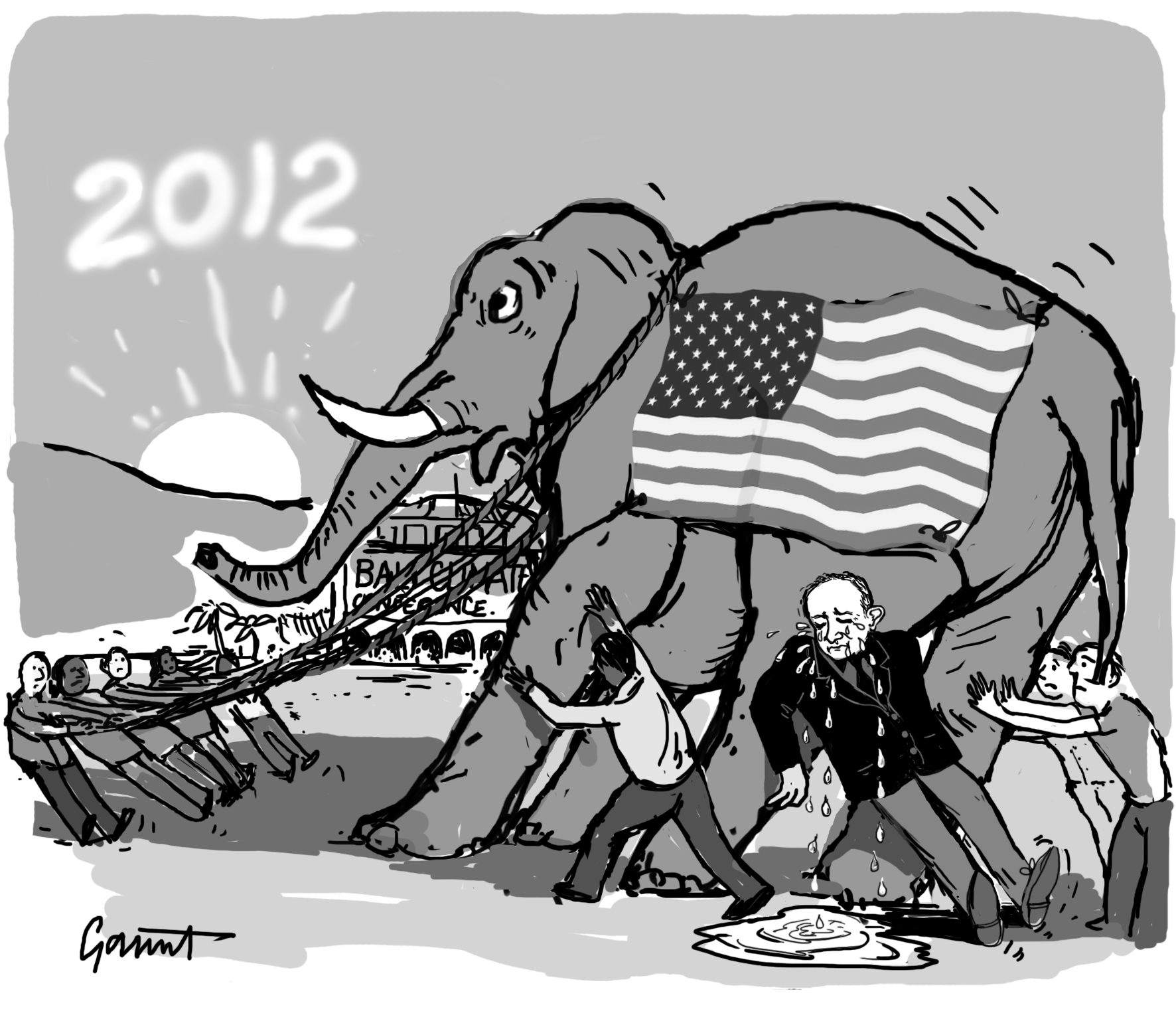| The latest round of the climate negotiations took place in Bali, Indonesia, in December 2007. Newswatch editors Sarah Granich and Mick Kelly report. |
The 13th Conference of the Parties to the United Nations Framework Convention on Climate Change and the Meeting of the Parties took place in Nusa Dua, Bali, Indonesia, December 3rd-14th 2007. A major theme of the meeting was "Forests for Carbon".
The conference needs to deliver "a breakthrough in the form of a roadmap for a new international agreement on enhanced global action to fight climate change in the period after 2012," when the first commitment period of the Kyoto Protocol expires, said Yvo de Boer, head of the United Nations Framework Convention on Climate Change Secretariat, as the Bali meeting opened. Though there was no expectation that the conference would result in a fully negotiated and agreed climate deal, the meeting would have to set the necessary wheels in motion if the negotiations were to conclude in 2009 in order to allow time for ratification.
Just what the roadmap should cover was the subject of much debate. Whether or not to include specific emissions reduction targets proved a serious source of contention. The European Union favoured an explicit goal of a 25 to 40 per cent reduction in emissions below 1990 levels by the year 2020, but this was strenuously opposed by the United States. Japan also opposed the inclusion of explicit targets. The European Union's wish list also included strengthening the carbon market and boosting funding to help poor countries adapt.

© 2007 Lawrence Moore
After over-running by one day, the conference reached agreement on a roadmap, the Bali Action Plan. The agreed text of the roadmap only refers to the need for "deep cuts in global emissions." But with this concession, as well as others, the United States has agreed to play a role in developing the post-Kyoto regime.
The Bali Roadmap commits negotiators to considering, on the part of developed country Parties, a commitment to "measurable, reportable and verifiable nationally appropriate mitigation commitments or actions, including quantified emission limitation and reduction objectives,... while ensuring the comparability of efforts among them, taking into account differences in their national circumstances."
The negotiators will consider "nationally appropriate mitigation actions by developing country Parties in the context of sustainable development, supported by technology and enabled by financing and capacity-building, in a measurable, reportable and verifiable manner." Disagreement over the wording related to mitigation efforts by developing countries and technology transfer threatened to derail the process on the final day. See box below.
The development of international cooperation to support urgent implementation of various actions on adaptation is also on the agenda, focusing on the immediate needs of developing countries that are particularly vulnerable to the adverse effects of climate change.
Negotiations on the post-Kyoto agreement will be finalized in Copenhagen in late 2009. The first meeting of the Ad Hoc Working Group on Long-Term Cooperative Action, which will be responsible for the negotiating process, will take place no later than April 2008.
Agreement was also reached in Bali on the future of the Reduced Emissions from Deforestation in Developing Countries (REDD) scheme, with a commitment to "early action" ahead of the successor to the Kyoto Protocol coming into force in 2012. Methodological work will focus on assessments of changes in forest cover and associated greenhouse gas emissions, methods to demonstrate reductions of emissions from deforestation and estimation of the amount of emission reductions from deforestation. The ultimate aim is that credits will accrue from avoided deforestation, as from renewable energy projects under the Clean Development Mechanism.
"Every previous attempt to have a forest convention bombed because it tended to be a bunch of developed countries telling developing countries what to do," commented John Lanchbery of the Royal Society for the Protection of Birds. "This was a developing country proposal. It was very cleverly done and avoids all the nasty pitfalls of previous attempts. It is nice and simple. It's about reducing carbon emissions and climate people can understand that," he continued. The initiative was a favoured project of the conference hosts, Indonesia. The World Bank recently announced a new pilot scheme for entering forest-based carbon credits into the global trading market.
In a major development, the Kyoto Protocol's Adaptation Fund will be managed by a new body, answerable to the Conference of the Parties to the United Nations Framework Convetion on Climate Change, rather than being run independently by the Global Environment Facility (GEF). "This is a major victory," said Amjad Abdullah, chair of the Least Developed Countries negotiating group. "The African countries, small island states and least developed countries stuck together and fought for a dedicated secretariat with a representative governance board that has special places for the most vulnerable nations."
The GEF will provide the Fund's secretariat, which will report to a board consisting of representatives of all the world's major regions, in addition to the countries most vulnerable to climate change. The majority of members will come from developing countries and, if decisions require a vote, this will be on the basis of one country one vote. The arrangement will give "developing countries a more direct and equitable voice in how funds are prioritized and spent," commented South African environment minister Marthinus van Schalkwyk. The GEF's role will be reviewed after three years.
Finally, it was agreed that a strategic programme to scale up investment in the transfer of both the mitigation and adaptation technologies needed by developing countries would be kick-started. Performance indicators for technology transfer are to be developed by the Expert Group on Technology Transfer, which will be re-constituted for a further five-year period. Various training activities, including regional workshops, were also agreed, including a meeting on technologies for adaptation.
| Agreeing the Bali Roadmap |
|---|
|
[T]ext on mitigation caused ongoing debates that were only resolved in the closing plenary on 15 December. While the US, Canada and others sought stronger language on developing country action/commitments, the G-77/China opposed this, and instead sought to place the focus on language dealing with Annex I commitments. In spite of reported progress during small-group consultations held on Friday night, this issue was still unresolved when the COP convened at 8:30 am on 15 December. President Witoelar presented a 'Proposal by the President' (FCCC/CP/2007/L.7) in an effort to engineer a compromise. India drew the President’s attention to his country’s preference for a paragraph on nationally appropriate mitigation actions by developing country parties in the context of sustainable development, supported by technology and enabled by finance and capacity building in a measurable, reportable and verifiable manner. The plenary was subsequently suspended and further informal consultations were held. When the plenary reconvened on Saturday afternoon, the EU and several developing countries said they could support India’s proposal, while the US stated that she could not accept this formulation. Responding to US comments, South Africa noted that a paragraph on developing country mitigation goes further than what was expected in the Convention, while the paragraph on developed country commitments was not as strong as he would have liked. Papua New Guinea asked the US to 'get out of the way' if it was not willing to lead. The US responded that, after listening closely to the interventions, she was heartened by the expressions of commitment by developing countries and major emerging economies. She said the US wanted to go forward as part of a new framework and to be part of the roadmap. Therefore, she agreed to join the consensus on the matter. With this final issue resolved, the text was adopted. |
"We now have a roadmap, we have an agenda and we have a deadline. But we also have a huge task ahead of us and time to reach agreement is extremely short, so we need to move quickly," said de Boer, as the meeting ended. Within days, the United States had underlined just how much distance would have to be covered as the White House announced that it had "serious concerns" about the Bali agreement.

© 2008 Lawrence Moore
Even before the White House statement, the United States had come in for severe criticism for the stance it took at the Bali meeting. "The Bush administration - dragging Canada, Japan and Russia in tow - has thrown away the compass and is trying to force us all to take the journey in a gas-guzzling 4x4, not the solar-powered speedster that the world urgently needs," commented Antonio Hill, senior climate change policy adviser at Oxfam.
China announced that it was satisfied with the Bali Action Plan, but called on the United States to do more. "The United States is an important contributor of emissions both in total and on a per-capita basis. It has both advanced technology and ample funds," said Yu Qingtai, China's climate change ambassador. "So on the issue of tackling climate change, America should display a more positive, more constructive role," he continued.
On the precise nature of any emissions control commitments taken on by major developing nations such as China in a post-Kyoto agreement, and the related issue of technological assistance to developing countries, the Bali meeting rehearsed what may prove to the key debate, if not deal-breaker, in the next stage of the negotiations. The United States has long stressed the need for the leading developing nations to accept some curb on emissions growth and, for their part, developing nations underline the the need for technological and financial support from the industrialized world, responsible for the bulk of historic emissions.
Further information
The Tiempo Climate Cyberlibrary provides hourly coverage of climate news. For further discussion of recent climate negotiating meetings, visit Earth Negotiations Bulletin.